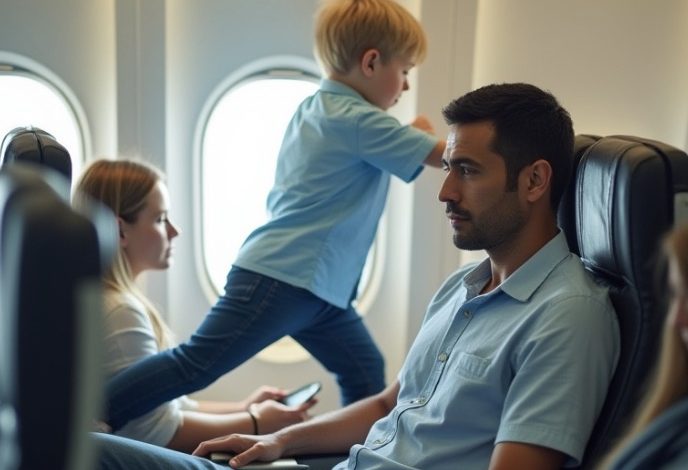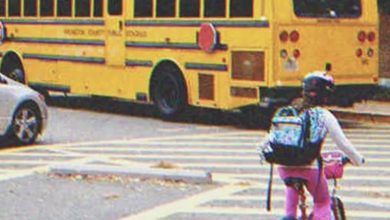“Andrew Collins Tried Everything to Stop the Kicking—Until a Simple Action Turned the Tables”

The Boeing 737 hummed steadily as it cut through the bright blue sky, the clouds drifting lazily below. Andrew Collins, a 42-year-old investment consultant from Chicago, eased into his seat with a long, controlled breath. It had been a punishing week in Dallas—back-to-back client meetings, endless financial forecasts, and little rest. Now, finally, he was heading home.
Beneath his seat rested his leather briefcase, packed with files he barely wanted to look at again. On his tablet, the slides for tomorrow’s meeting glowed back at him. Usually, flights were his sanctuary: two, sometimes three, hours of forced calm where he could either prepare in peace or allow himself the rare luxury of sleep.
This time, however, the flight would become something else entirely—a test of patience, dignity, and strategy.
The First Kick
Barely ten minutes after takeoff, Andrew felt it.
A sharp bump pressed into his lower back, quick and unexpected. At first, he dismissed it. Turbulence, perhaps, or just the shift of someone behind him settling in. He adjusted his tie and tried to ignore it.
Then it came again. And again.
The jolts followed a rhythm—short, repetitive thuds that rattled his seatback. Andrew frowned, turned his head slightly, and glanced behind him.
A boy, no older than seven, sat with his legs bouncing against the seat in front of him—Andrew’s seat. His sneakers thudded like tiny hammers. Next to him, a woman, presumably his mother, scrolled casually through her phone. She seemed oblivious, or perhaps willfully blind to the disruption.
Andrew forced a polite expression. He leaned over slightly and said in a calm, measured tone:
“Excuse me, would you mind asking your son not to kick the seat?”
The woman lifted her eyes briefly, gave a curt nod without speaking, then returned to her phone.
For a brief moment, the kicks stopped. Relief flickered across Andrew’s face.
But within a minute, the thudding resumed—harder, louder, relentless.
Endurance and Irritation
Andrew clenched his jaw and shifted in his seat. He tried to focus on his slides, but the constant pounding dissolved his concentration. The words on the screen blurred, his thoughts scattered.
He closed his eyes and tried to will himself into calm. It’s a two-hour flight. Surely, this won’t last.
But it did.
Minute after minute, the boy continued, pounding as if the seat were a drum. Andrew’s back began to ache. His patience began to wear thin. His breathing grew tight.
Finally, he turned again, his tone firmer than before.
“Ma’am, your son is disturbing me. Could you please stop him?”
The woman sighed, her annoyance directed not at her son, but at Andrew.
“He’s just a kid. Relax.”
And with that, she looked away once more.
Calling for Help
Andrew pressed the overhead call button. A flight attendant appeared quickly, crouching down with a kind smile.
“Sweetheart, can you stop kicking the seat, please?” she asked the boy gently.
The child giggled, nodded dramatically, and within thirty seconds resumed his kicks.
The attendant turned to the mother. “Ma’am, could you—”
But the woman cut her off with a shrug. “I can’t control him.”
The attendant gave Andrew an apologetic glance. The flight was full. Switching seats wasn’t possible. She whispered, “I’m sorry, sir,” and moved on.
Two hours stretched ahead like a sentence in a noisy prison. Andrew sank back, realizing the torment wouldn’t end on its own.
A Plan Forms
Andrew was not a man of sudden anger. His career depended on composure, persuasion, and strategy. He had built his reputation by staying calm under pressure, by finding solutions when direct confrontation failed.
Now, as his back absorbed each relentless kick, he began to think.
If asking politely failed, and if authority in the form of the flight attendant failed, what remained? Influence through consequence.
He scanned the cabin quietly, taking in the scene behind him. The boy’s tray table was cluttered with crayons and a half-full plastic cup of orange juice. Each time he kicked, the table rattled slightly, the liquid sloshing inside. His mother barely noticed, still scrolling on her phone.
Andrew inhaled deeply. If words weren’t enough, then reality would need to speak louder.
The Tipping Point
Another kick jolted him, harder this time. His coffee nearly spilled into his lap. Andrew steadied the cup and exhaled slowly.
The next kick came. And the next.
Timing it perfectly, Andrew pressed the recline button and leaned his seat back—just enough, and just at the right moment.
The tray table behind him shook violently. The boy’s juice cup tipped over, spilling bright orange liquid across his coloring pages and straight into his mother’s lap.
Her reaction was instant.
She yelped, jumping in her seat, staring at the spreading stain on her jeans. The boy froze mid-kick, eyes wide in shock. Passengers nearby turned their heads, some stifling laughter.
“Mom! It wasn’t me!” the boy cried, panicked.
But the evidence told a different story. His wild kicking had clearly set the spill in motion.
For the first time, the mother turned on him.
“I told you to SIT STILL!” she snapped, fumbling with napkins.
The cabin shifted. The irritation once aimed at Andrew was now redirected where it belonged.
Silence at Last
Andrew remained perfectly calm, eyes forward, expression neutral. He did not smirk or gloat. To anyone watching, it looked like a natural consequence of the boy’s behavior. Only Andrew knew the timing had been deliberate.
The kicking stopped. Entirely.
For the rest of the flight, the boy sulked quietly, arms crossed, muttering under his breath but keeping his feet still. His mother, too busy drying her clothes and scolding him, no longer ignored the problem.
Peace, at last, settled over Andrew’s seat.
He scrolled through his slides again, this time uninterrupted. For the first time since takeoff, he allowed his shoulders to relax. A faint smile tugged at his lips—not of triumph, but of quiet satisfaction.
He had not raised his voice, not argued, not lost his composure. He had simply let reality do the teaching.
Reflection
As the plane began its descent toward Chicago, Andrew considered what had just happened.
Life, he thought, was full of people who refused to acknowledge their impact. Some colleagues dismissed deadlines. Some parents ignored their children’s behavior. And no matter how politely one asked, sometimes words were not enough.
But consequences were undeniable.
The spilled juice was a lesson—a metaphor, even. Just as in business negotiations, where clients often ignored warnings until costs hit them directly, sometimes the only way to drive change was to let people feel the problem themselves.
Landing
When the wheels touched down, the cabin filled with the usual shuffle of passengers gathering their belongings. The mother avoided Andrew’s eyes. The boy dragged his backpack down the aisle, quieter than he had been all flight.
Andrew stood, collected his briefcase, and walked calmly off the plane.
Inside the terminal, he paused by a window, watching other planes taxi along the runway. For all the irritation of the last two hours, he felt oddly invigorated. The experience reminded him of the power of strategy, the elegance of timing, and the strength in restraint.
Not all victories came with applause. Some came in silence. Some came in the calm restoration of dignity.
And on that flight, with patience, wit, and one perfectly timed action, Andrew Collins had reclaimed his.










